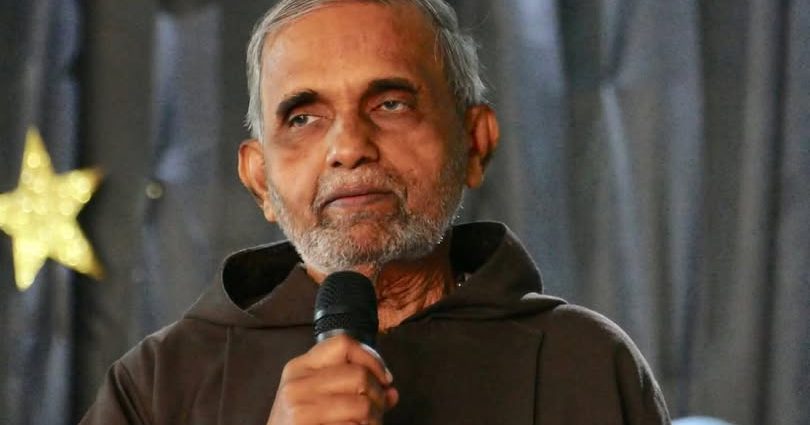Indian Church mourns death of trailblazing priest editor
Jose Kavi - March 2025

Capuchin Father Xavier Vadakkekara, who braved partial blindness to inject new life into India’s leading Church weekly “Indian Currents” and mentor many young journalists, died on March 16. He was 72.
The death occurred at 11:35 pm at Holy Family Hospital New Delhi, where he was admitted for the treatment of acute respiratory insufficiency.
His funeral services will he held at 3:30 pm on March 18 at Khrist Raja Church in Dasna, Masuri in Uttar Pradesh. Later his body will be given to the All India Institute of Medical Sciences in New Delhi, as per his will.
Bishop Henry D’Souza of Bellary, chairman of the Office of Social Communication under the Catholic Bishops’ Conference of India, expressed profound sadness over the death of Father Xavier, as he was popularly known.
“He was a person with keen intellect and committed media person. He was people-friendly and compassionate. In his death the Church in India has lost an excellent media person with Christian values,” the bishop said.
Father Xavier’s confrere Father Suresh Mathew hailed him as “a trailblazing Capuchin priest, journalist, and media leader who left an indelible mark on the Catholic media landscape in India.”
Father Mathew, another former Indian Currents editor, said Father Xavier “was a driving force behind the Catholic Church’s efforts to engage with the world through the media. His visionary leadership, intellectual curiosity, and passion for social justice inspired a generation of Catholic journalists, writers, and thinkers.
A J Philip, a veteran journalist associated with Father Xavier for years, says the Catholic priest injected new life into the Indian Currents, founded by the late Fr John Vallamattom as a Catholic Bishops’ Conference of India publication.
Father Xavier became its editor when his congregation took over the weekly in 1998 when it was on the verge of closure due to financial constraints.
Under his editorial guidance, the weekly “became beacons of progressive Catholic thought, tackling tough issues, and providing a platform for marginalized voices,” Father Mathew said.
He had done the same to Assisi, a Malayalam monthly magazine he edited earlier based at Kerala’s Bharananganam town.
Father Xavier’s “commitment to excellence, accuracy, and fairness earned him the respect and admiration of his peers and readers alike,” Father Mathew added.
Father Xavier was also the director of Media House in Delhi, playing “a pivotal role in shaping the Catholic Church’s publishing strategy in India. He was a master strategist, able to navigate the complexities of the media landscape with ease,” Father Mathew said.
“He never shied away from confronting the government or exposing fundamentalist elements in the country through his work at Indian Currents weekly.”
Father Xavier also addressed issues within the Church. “I recall a particularly striking cover page of Indian Currents that highlighted the denial of a funeral for a Catholic in a Kerala diocese, while also commending a bishop from North East India for his peace-building efforts among warring groups. His commitment to truth and justice was unwavering, and his legacy continues to inspire,” Father said.
Philip pointed out that Father Xavier had nine siblings, “Only two of them became householders; the rest chose a life of priesthood or religious service. Few families would have contributed as much human capital to the Church as his.”
Father Xavier was born on January 25, 1953, Neeloor, near Palai in Kerala. His family later moved to Vadakkancherry in Palakkad.
He was ordained a priest on April 19, 1980. After ordination, he worked with Assisi magazine.
He did his doctorate in the Philippines. On his return, he served as a professor of communication at Vijnananilayam, Janampet, in Andhra Pradesh.
In 1993, Father Xavier moved came to northern India and set up Media House, a publishing house in Suryanagar in Uttar Pradesh on the Delhi border.
He was also instrumental in setting up Shramik Vidya Peeth, later known as Jan Shikshan Sansthan, an institution for adult and skilled education. This was the first Shramik Vidya Peeth granted to the Catholic Church by the Indian government.
He also establish the Media Institute of Training and Technology at Surya Nagar primarily for computer education, in the 1990s. He also played a key role in establishing the Assisi Institute of Training and Technology in Noida, Uttar Pradesh, which offered master’s programs in communication and journalism, affiliated with Hisar University, Haryana.
Another initiative of Father Xavier Children’s Help in Life Development, a project aimed at educating street and slum children at Ghaziabad in collaboration with Caritas India.
In 1998, he took over the Indian Currents with the support of the Capuchin Mission of Krist Jyoti. He served as its editor until 2006.
Under his guidance, Jyoti Press, a printing unit, was established in Noida in 2002.
In his final days, Father Xavier was in Kerala, where he spent time with his brother, Father Benedict Vadakkekara, at a Capuchin ashram in Kattappana, Idukki district. He returned to Delhi in February but fell ill by the end of the month.
(Courtsey: mattersindia.com)
Send your feedback to : onlinekeralacatholic@gmail.com